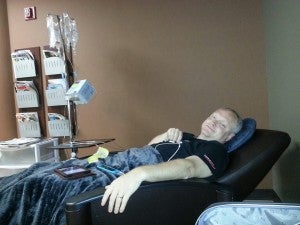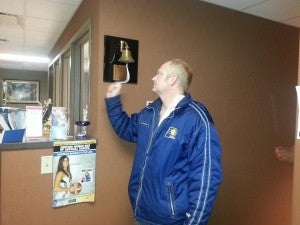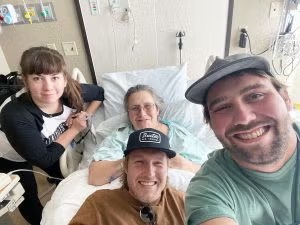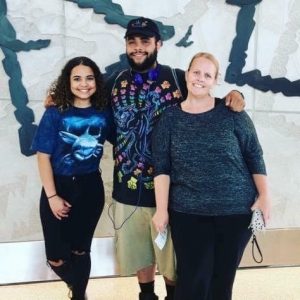Personal Touches Aid Colorectal Cancer Recovery
March 13, 2015
By: Riverview Health
Categories: Riverviews
Tags: Cancer, chemotherapy, Colorectal Cancer, Riverviews, Riverviews Winter 2014
Every three months when Bradley Kinkead stops by Riverview Health for blood tests, he knows he can count on being greeted with hugs from three oncology staff members, just as they did when he started chemotherapy treatments a year ago.

“It’s not just acting like they care. They really do care,” Bradley says.
Bradley’s journey began in June 2013, when he went in for a colonoscopy as a result of having some bowel problems for a few months.
After the colonoscopy, Bradley woke up to find his wife crying on the phone.
“It’s cancer, isn’t it?” he asked.
“Yes,” she choked out.
Bradley, a then 38-year-old Noblesville husband and father of two, was diagnosed with early-stage colorectal cancer.
“The way I saw it, I could either be upset about it, or I could fight it. So, I decided to fight it and not let it change me,” he said.
A month after the diagnosis, Bradley underwent surgery to remove his large intestines.
“There’s so much uncertainty and fear before having surgery, but I was put at ease by the nursing staff who took care of me. I know they’re busy, but they took the time to sit down, reassure me and educate us on what was going to happen. It was scary, but they were there for me,” Bradley commented.

During the surgery, a temporary ileostomy bag was attached to collect bowel movements while his bowel healed.
“Having a bag wasn’t ideal, but my wife and the staff were amazing as far as helping me with it,” Bradley said. “There were nights when I’d be asleep and the bag would detach. My wife was there to help clean it up. I couldn’t have done it without her.”
Then came the chemo. Bradley’s oncologist at Riverview Health, Daniel Milton, MD, ordered 24 weeks of IV chemotherapy treatment to happen every other week.
Was it going to hurt or make his symptoms worse? Bradley felt uneasy and worried.
“Dr. Milton and the nurses really took good care of us. We’re so grateful for them,” Bradley said.
Sometimes the most important part of treating a patient isn’t only the medicine that’s involved.
“I think a key thing is to remind patients what’s at stake and that they have some control over their health,” Dr. Milton says. “It’s my job to help them see the bigger picture and make it clear that the doctor’s office is a safe place to chat about life concerns.”
While undergoing chemotherapy treatments, Bradley knew the world wouldn’t stop. He continued to work 40- to 50-hour weeks at his job as general manager of an auto parts shop. “I think he’s a great example of how life goes on for a lot of these patients,” Dr. Milton said. “This isn’t a disaster or a huge interruption of his life. In some ways, he was heroic to go through all this and still support his family at the same time. Bradley has had a very business-like demeanor of doing whatever it takes to get the job done and to not let this affect his life in a negative way.”
But abdominal pain—a side effect from the chemotherapy—sent him to the emergency room. Dr. Milton lessened his chemotherapy treatment to help combat the abdominal pain.
Finally, in January 2014, chemotherapy was complete and by mid-February, a CT scan showed the cancer was gone.

A couple of weeks later, it was time for surgery to reattach his intestines to get rid of the ileostomy bag.
Two days after the surgery, Bradley needed emergency surgery after a bout of vomiting ripped his stitches out. During a 20-day stay at Riverview Health, he got to know the nurses very well.
“The nurses were great, but at times they were a pain because they were doing their jobs by making me get up and walk to stay active and do breathing treatments,” Bradley joked.
Being a cancer patient takes a toll not only on your health, but emotionally too, Bradley says.
“Not surviving wasn’t an option. No one wants to go through what I went through, but everything was made more tolerable with a friendly hospital staff and expert physicians that continually went above and beyond,” he said.
Bradley doesn’t miss being stuck in a patient bed, but knows he can count on friendly faces to greet him when he’s back for routine tests.
“Going in for blood tests isn’t scary—I just think of it as getting to see my friends,” he said.
Learn more about Riverview Health Cancer Services >>





